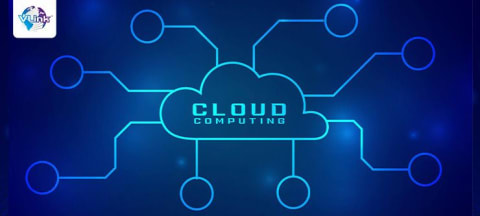A Beginner’s Guide: Types of Cloud Computing Services to Integrate in Business
The migration to the cloud and use of cloud computing services in the ever-changing business environment has significantly increased and for obvious reasons. The benefits of cloud computing, storage, databases, software, and networking are far too many and too great to be ignored.
 18 minute
18 minute

However, the concept is still new, and the lack of understanding about the types of cloud computing as well as its services and functions makes businesses unsure about adopting the cloud.
This blog intends to clear the mist surrounding cloud computing technology and help you acquire an in-depth understanding of everything it can do for your business.
What is Cloud Computing?
Cloud computing is the delivery of IT capabilities and resources – including servers, databases, storage, software, networking, analytics, and intelligence – over the internet (metaphorically called “the cloud”). A cloud infrastructure replaces or reduces your dependency on costly, high-maintenance physical data centers, facilitating faster innovation and economies of scale.
With Google and AWS cloud computing services providers, you also enjoy on-demand access to computing resources, paying only for what you use. As a result, you significantly lower your operating cost and easily scale up and down your IT resources as your business changes.
Main Benefits of Cloud Computing Services
Cost
Using cloud computing reduces or even eliminates your dependency on hardware, software, and in-house servers. As a result, you save significantly on power consumption, cut down on capital expenses, and let go of costly IT resources.
Scalability
In a cloud environment, businesses can scale up and down automatically on several fronts: IT infrastructure, storage, and bandwidth. With a pay-as-you-go model, you get the flexibility to get maximum use out of cloud resources while keeping your cloud spending in check.
Security
Cloud providers can offer different security solutions to protect your data, applications, files, and more from inside and outside threats. These solutions can help strengthen your business’ security posture and ensure compliance much like or even better than your in-house data centers.
Speeds
Most AWS and Google cloud computing services are available on-demand and allow self-service. You enjoy quick access to a vast amount of computing resources which you can provision anytime and from anywhere to tackle increased service levels.
Reliability
Data recovery is quite a challenge in the event of a disaster if you work with computer servers. However, with the off-site cloud infrastructure, your data is stored in different locations. This redundancy ensures that you have a backup to recover everything after a disaster and ensure uninterrupted customer service.
Different Types of Cloud Computing Services
Cloud computing is an umbrella term for all types of off-site computing services available. Each type offers various levels of management, control, and flexibility. These services have main four broad categories:
IaaS
Infrastructure as a Service is the most fundamental and cost-effective way of taking advantage of the cloud. IaaS involves renting servers, computing capabilities, operating systems, and more from a service provider like AWS or Google.
PaaS
Platform as a Service offers an on-demand cloud computing environment for companies involved in the development, testing, and management of new applications. This eliminates the need for on-site infrastructure as well as the time and cost involved in maintaining it.
FaaS
Function as a Service is a collection of serverless computing services that facilitate seamless migration of applications to the cloud, ensuring efficiency and cost-effectiveness. FaaS manages everything so that you needn’t to make additional infrastructure management efforts.
SaaS
Software as a Service is a method for fulfilling on-demand software delivery over the internet. The service provider typically offers the service on a subscription basis and takes care of the infrastructure and maintenance. As a result, users can connect and perform software upgrades from anywhere, at any time.
Ways to Integrate Cloud Computing in Your Business
Cloud resources can be deployed in three different ways. Each delivery model is unique, requiring specialized management capabilities and cloud computing technologies and offering different security features. For this reason, businesses gain maximum advantages by using more than one type of model. Typically, you have the following three options:
Public Cloud
In a public cloud model, multiple tenants share the same IT infrastructure hosted by the cloud provider, like AWS, Azure, or Google. However, sharing a common platform doesn’t mean that third parties gain unauthorized access to your data. Every user utilizes common remote servers, storage, and networking capabilities but through a separate secure account.
Private Cloud
The private cloud model delivers computing resources exclusively to a single entity and offers greater flexibility and customization. Either a cloud provider or your in-house IT management at the on-premises data center can manage it easily.
Hybrid Cloud
As the name suggests, the hybrid uses a combination of public and private clouds. Depending on your needs and budget, you can keep critical applications and data in a private cloud where you get high security, while the other standard systems can reside in the public cloud, which is a more cost-effective option.
Best Cloud Computing Services in NYC, Connecticut & Other States
From small, growth-oriented businesses to large corporations, cloud migration is accelerating digital transformation for all. However, the road to successful cloud migration challenges with difficult choices.
To get the maximum benefits from cloud computing technology, a business needs to select the most suitable cloud computing service, outline an integration pattern, and determine the priority levels of all the applications before migrating to the cloud.
Working with an experienced cloud computing services provider in NYC or Chicago is the surest means to get the knowledge and guidance needed to establish a smooth cloud adoption process.
Putting it Together
VLink enables businesses to improve their bottom line and gain a significant competitive edge by utilizing the power of cloud computing services in Chicago, NYC, Northeastern states, and other regions. Our cloud computing solutions provide many valuable benefits and advanced computing resources, which can be provisioned instantly and scaled as needed.
Adopting the cloud also makes teams more efficient and accelerates the application launch and update processes as the team gets quick access to all the resources and services they need – unlike with a traditional on-premises infrastructure which can be costly and time-consuming.
Connect with the Cloud specialists at VLink with questions and get expert advice about our cloud computing services.










